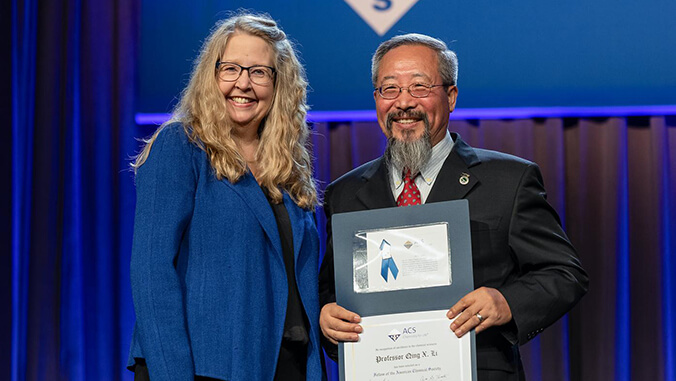
A researcher’s determination to tackle agricultural chemistry issues relevant to Hawaiʻi and his dedication to the American Chemical Society (ACS) have earned him a place as an ACS fellow.
During the induction ceremony on August 14 in San Francisco, Professor Qing X. Li from the University of Hawaiʻi at Mānoa College of Tropical Agriculture and Human Resources’ (CTAHR) Department of Molecular Biosciences and Bioengineering (MBBE) was recognized for two citations—Contribution to the Science/Profession and Contribution to the ACS Community.
“It is a great honor to be recognized as an ACS fellow; I am beyond blessed and humbled,” said Li. “This encourages me to continuously address critical agricultural issues in Hawaiʻi such as pesticide contamination, pest control and green pesticide discovery.”
“Our heartiest congratulations on being a part of this distinguished group of ACS fellows!” said ACS President Angela Wilson.
An ACS member since 1989, Li had just assumed a leadership post when the COVID-19 pandemic occurred; he subsequently oversaw many ACS programs’ conversions to virtual environments, enabling ACS to continue serving its members.
Contributions to the agricultural chemistry community
When Li joined MBBE in 1995, his research focused on chemical proteomics (the study of proteins), phytopharmaceuticals (plant-based drug class), food chemistry and safety, pesticide chemistry and environmental monitoring and remediation.
Li has nearly 500 peer-reviewed scientific publications that have been cited more than 16,000 times. Additionally, Li has 20 patent applications and licensing and technology disclosures, and serves as editorial board member for five journals.
He is a past and present member of numerous USDA National Institute of Food and Agriculture multistate research projects, including the agrochemical impacts on human and environmental health, a pesticide registration program and more.
Furthermore, Li’s research has had state-level impacts in ensuring food safety of pesticides; discovering phytopharmaceuticals relevant to Alzeimer’s disease and obesity; and leading the development of immunoassays (biochemical tests to detect specific molecules) and biosensors, which are used to image and quantify proteins and small molecules.

